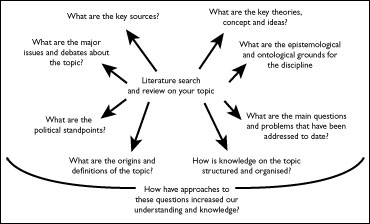"The selection of available documents (both published and unpublished) on the topic which contain information, ideas, data and evidence written from a particular standpoint to fulfil certain aims or express certain views on the nature of the topic and how it is to be investigated, and the effective evaluation of these documents in relation to the research being proposed".

Difference between Master’s Thesis / What is a Thesis? According to the definition of Webster’s New collegiate “a proposition that a person advances and offers to maintain by argument”. There are three elements under this definition.
Writing the Thesis / Dissertation – Purposes There are three perspectives which we need to examine the purposes First, the Institutional purpose: To ensure that the degree holder has made a contribution to his/her respective field and to uphold an honoured academic transition. Further, candidate’s fitness to conduct and publish research and for institution generating and disseminating new knowledge is a important purpose. Second: Personal Purpose is to earn your PhD degree but apart from that you should see it as a way of learning. Only when you write the dissertation, you will able to understand much about yourself and about the topic you have researched. Further you can make your PHD dissertation / thesis better one if you consider seriously the expectation that you will make a contribution to scholarly knowledge. Third, the communication purpose: You have to write dissertation /thesis to inform with clarity but not to express personal feelings or to entertain. It should be clear at the same time simple. All the above three purposes helps to shape the PhD dissertation /thesis in a special way. Important elements of Thesis:
General Guidelines for thesis Formulation: All the PhD research scholars need to consider research objective, expected novelty, technical selection, algorithmic implementation etc. For non technical research scholors should consider predominantly research question, method, evidence and logic simultaneously. The basic checklist helps you to formulate your thesis.
The average length of dissertations seems to run around 200 pages, usually ranging between 125 and 225 pages. However, there are differences in fields of student. PhD thesis in the natural sciences tends to be shorter than those in the social sciences. Further, ethnographic investigations in general will be longer than those reporting experimental studies.
Secondly, thesis / dissertation are replete with citations of previous research and as a research scholar you are expected to know the previous literature and be able to cite it appropriately. Nevertheless, you cannot simply make assertions but document them.
For example Author writes, “Consumers feel more confident these days”. You cannot simply copy the same rather the scholar has to rewrite According to several recent studies, consumers surveyed report feelings of greater confidence about the economy.
Third, PhD thesis / dissertation should sound scholarly, formal rather than an informal essay, or colloquial, or an editorial and is objective not subjective.
Style of Dissertation: In general thesis or dissertation follows very specific rules with reference to their style, particularly requirements such as tables, headings and documenting source. Hence, its always better to check with your dissertation faculty member / mentor / guide for university preferred guidelines. Or Check out your previous colleagues PhD thesis / dissertation university guidelines